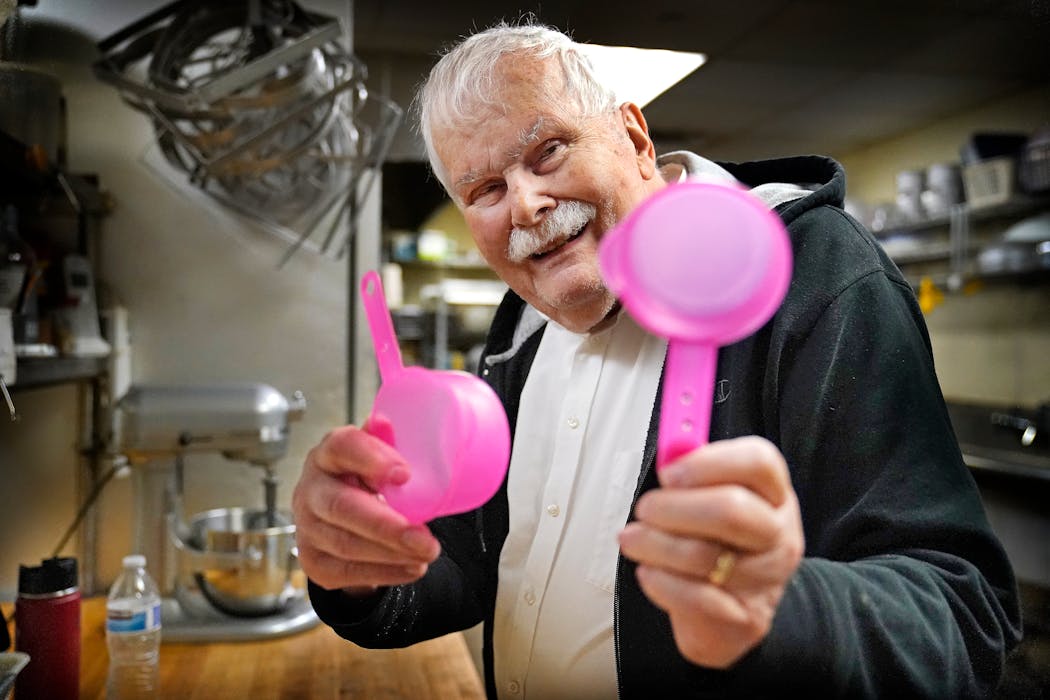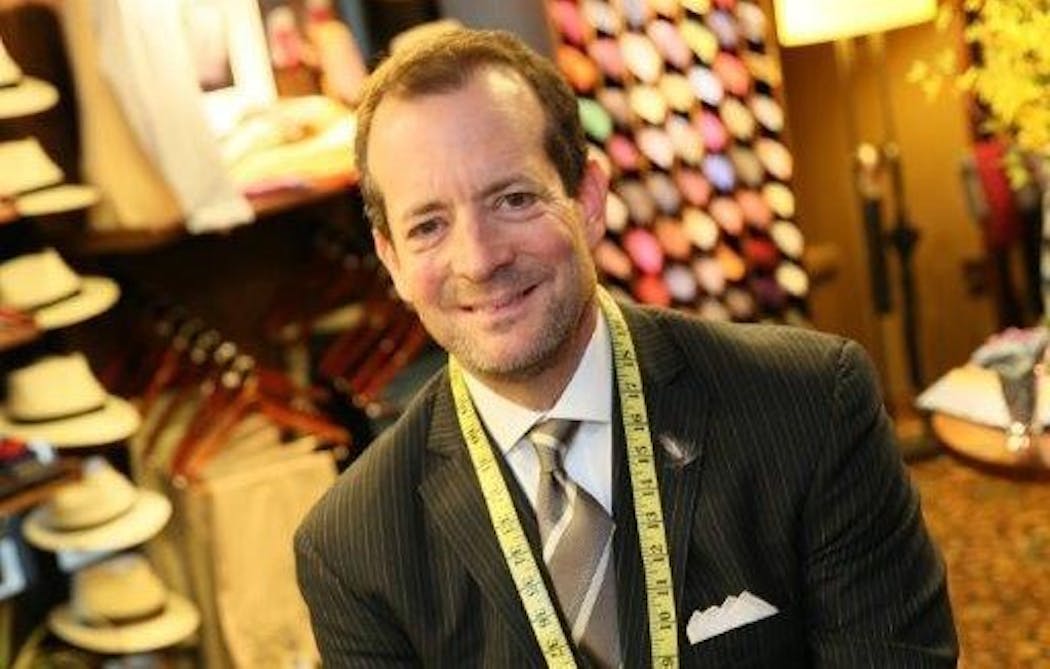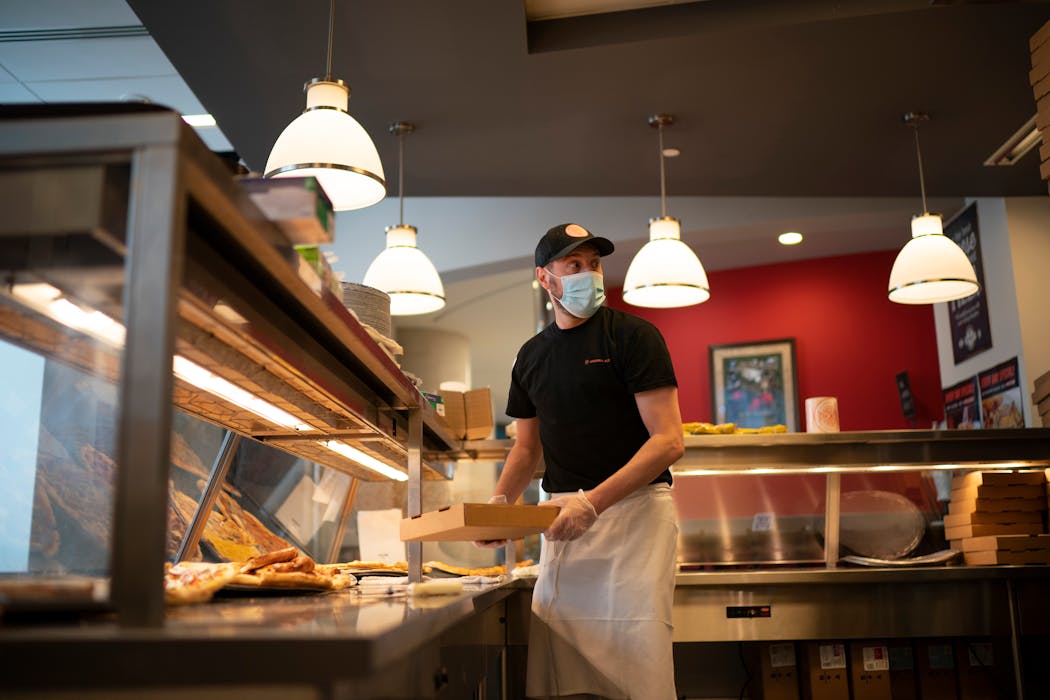A jeweler who opened his first store in the skyway 40 years ago. A corporate employee who made a midlife pivot into cookies and gave jobs to all his children and grandchildren. Some of the Minneapolis skyway's oldest businesses have passed through multiple generations. Others are run by octogenarian original founders who continue to tend shop every day.
Through memory and family, their connections to the city run deep. When COVID-19 brought a storm of challenges, many stayed open by the skin of their teeth. The pandemic's long-term impact on Minneapolis' downtown remains to be seen, but these business owners say they'll keep grinding as long as they can.
The Brothers Deli
All told, Jeff Burstein's family has been doing business in downtown Minneapolis for more than 80 years.
His grandfather Mike, who met his wife on the ship emigrating from Russia, opened Mike's Café in 1935. When their sons came home from World War II, they took over and called it the Brothers Deli. In the 1950s they were located at 19 S. 7th St., next to Dayton's where on weekends the streets were packed with cars and the ramp was always full.
Burstein recalls being 10 years old, gawking at a mural on the back wall of the original Brothers that depicted a futuristic downtown Minneapolis connected by a web of skyways that had yet to be built.
Business was phenomenal in the 1960s, he said. The regular clientele included characters whom he strongly suspected of being gangsters. The rise of the suburban shopping malls in the 1970s pulled customers away, but women joining the workforce was an infusion of life. Still, by the mid-1980s downtown had become less of a shopping center than an office hub.
"So how did downtown change? It's no longer a destination. It's just a place for people to work," Burstein said matter-of-factly. And now he sees the mall struggling because of online shopping.
Just before the pandemic, Burstein started to see a lot of seniors downtown. People with disposable savings who'd downsized from the suburbs, speed-walking the skyways in winter. It gave him hope that with all the new hotels and apartments, there would be a revival.
But as the pandemic dragged on, Target moved out thousands of employees and RBC built its own building. Fifty South Sixth, where Brothers Deli remains, is no longer the prime location it was. But he's doing well with catering, he said, and there's hope in law firm Fredrikson and Byron moving next door.
Standing in the way of downtown's return is a perception of danger that Burstein considers overblown. Occasionally there are shootings and people sleeping in the streets. Burstein, who used to live in Israel, wishes the people who demonize Minneapolis would go see more of the world.
His own attachment to downtown surpasses its challenges. From age 14, the 87-year-old Burstein would take the bus downtown and peel potatoes for the potato salad. His father, who had multiple sclerosis, would come to work every day in a wheelchair until a week before he died.
"I go to Brothers … I can see my dad there," Burstein said. "I can see the old customers. It brings me back to a nice time."
50 S. 6th St., #220, thebrothersdeli.com, 612-341-8007
Classic Cookie Co.
The smell of fresh-baked cookies – "classic" because they're still made with real eggs and butter – permeates the 2nd Avenue skyway where 88-year-old John Lundgren has peddled sugary therapy since 1985 at Classic Cookie Co. Among his sage advice for customers: "A well-balanced diet is a cookie in each hand."
On a Monday afternoon in September, John's three adult children — Andrea, Heather and Matt — and grandson Josh help bake, decorate and ring up orders. John's wife, Carolynn, still manages the books. Theirs is a true family operation. Apart from an 18-month spell in the darkest stretch of the pandemic, Lundgren almost never misses a day of work.
A former Western Union employee, Lundgren sold his father's war bonds and made a huge gambit launching into the cookie business. The mortgage and his children's college tuitions depended on the success of his dream.
"I love cookies. I mean if I'd been into ice cream, this would have been an ice cream shop," he said.
"No one starved," Matt Lundgren said.
When he first started, foot traffic and word of mouth was enough to not only keep the ovens on but allow John to employ a fair number of his children's classmates. Their skyway location meant the place closed on weekends, and John and Carolynn could have family time.
Maintaining that work-life balance was the biggest reason why they've remained in the skyway all these years, Heather Thorne said.
Now that their parents are older and downtown occupancy is having a slow rebound, the Lundgren children are trying to decide what to do. In the meantime, they've ushered in survival adaptations.
In 2019, the children persuaded John to start taking credit cards. During the pandemic, they catered wedding cookies as an alternative to cake, which requires cutting and touching. This summer, they started delivery through Uber Eats.
200 S. 5th St., #295, mplsclassiccookie.mysite.com, 612-338-1949
Gittelson Jewelers
Eugene Gittelson, with his striking white hair and immaculate suits, has run Gittelson Jewelers since 1985, when diamond earrings sold for $29.
He was a first-generation jeweler, getting his start at Dayton's before striking out to open his own shop in the skyway. These days, his son Michael helps him behind the counter.
Enterprising and social, Eugene used to make friends clubbing downtown, including befriending the late Twins star Kirby Puckett. The late 1980s and early '90s were prime years for the Twins, and Puckett partnered with Gittelson to offer a signed baseball with each $100 purchase.
Prince was a customer too. A framed Rolling Stone cover from 2004 shows him wearing a Gittelson Jewelers ring. When the artist came in to peruse jewelry, he had to ask talkative Eugene to calm down and not say too much because he knew what he liked, Michael Gittelson said, recalling his father standing in silence with Prince.
Gittelson stayed open through the pandemic when legally allowed, and remains one of few shops left in the Six Quebec skyway after COVID-19 decimated their neighbors.
Yet the family has survived even darker times. After the deaths of Eugene's wife and elder son — the one who was poised to succeed Eugene — Michael stepped in as both business partner and caretaker in his father's older age.
To manage his stress, Michael records TikTok videos of himself in a frenzy of satirical costumes, performing skits in front of assorted backgrounds. Some of the clips at @itzmikeg have racked up millions of views.
He's transferred those video production skills to Gittelson Jewelers' marketing. The shop has been around since before personal computers and credit card readers, but now it has an Instagram gallery of engagements and weddings in which their jewelry played a role. Serving those couples keeps his father young, he said.
Despite the challenges, it's Eugene's dedication to the shop and Michael's dedication to his father that keeps Gittelson Jewelers' doors open.
"My dad really opened the doors for me and I'm very grateful for what he did – such hard work, and got it rubbed off on us. He taught me how to follow through with people, how to look them in the eye, how to shake their hand and really genuinely be honest with people," Michael said. "I learn so much from him, still to this day."
601 S. Marquette Av., #218, gittelsonjewelers.com, 612-339-5153
Marty Mathis Clothiers
Making way for the struggling Northstar East tower's office-to-apartment conversion, Marty Mathis vacated his gentlemen's clothing shop at the end of August. Before he left, he slapped a defiant poster on the window declaring: "Marty Mathis will not be taken down by a pandemic or the sale of a building!"
A tailor since 1977, he has occupied a north-facing skyway shop for some 22 years and plans to return downtown following his construction-imposed sabbatical. He's in talks with different buildings downtown, but doesn't intend to go far.
Deemed nonessential during COVID-19, Mathis survived by staying in touch with longtime customers, some he'd dressed for 40 years. Quality men's clothing doesn't wear out easily, so in the pits of the pandemic when customers insisted on ordering new sets of suits and blazers he knew they already had, he understood they were just trying to keep him above water.
"I had clients that I haven't seen in three or four years coming back and replacing things," he said.
When he started working downtown in the 1980s, you could throw a suit up in the air and three or four customers would try to grab it before it hit the ground, Mathis recalled. Lapels, shoulders — everything was big. He has a well-tested theory that when the economy does well, men go bolder with pattern and color. In times of recession and political instability, they want trim, austere cuts. These days, a lot of people seek that edgy and sleek Don Draper look.
It sounds like a joke now, but in 2000 when Mathis moved his shop downtown, the biggest fear was that a Y2K computer bug would trigger global collapse. Turns out, the world was all right.
"The Northstar, I couldn't have been happier with my time here. But I've got another 10 years or so doing this, so onwards and upwards," he said.
martymathisclothiers.com, 612-382-0480 or 612-341-2833
Andrea Pizza
Frank Gambino works every day in the Capella Tower behind the counter of Andrea Pizza. It's one of two skyway restaurants founded by his father Andrea, a Sicilian immigrant who brought his family to the East Coast and eventually Minneapolis. He settled in the skyway because the hours allowed him to work a 40-hour week and still have a life with his family.
In 1992 when they arrived downtown, Minneapolis had surging homicide rates. But as a teenager Frank had no inkling of that, he said. To him, Minneapolis was an upgrade from the rougher neighborhoods of New York and Philadelphia, where they'd lived previously. It was clean, green and beautiful. The skyways brought everybody together for lunch, and he got to interact with the same people every day.
He never considered doing anything other than running the restaurants, and for years they were enough to provide for him and his employees — some of whom he's known for decades.
But when COVID-19 hit, he was left with zero income, no unemployment and four kids at home. Even when the moratorium ended, there were days he'd get 10 customers in all, and then he'd go home and watch standalone pizza restaurants expand their delivery empires.
"That's why it was so tough, coming in and seeing something you worked for, for 22 years grinding, gone, vanished in one second," Gambino said.
His father told him to keep faith. Gambino isn't convinced that downtown Minneapolis hasn't been replaced by virtual work and suburban office parks. His flagship location in CapellaTower is still making just one-third of pre-pandemic revenue. But he is choosing to stay.
"This is my store. I put my life into it," he said. "I just dug in till the end. I lose my house, I lose whatever, at the end of it at least I made a decision."
225 S. 6th St., Capella Tower and 330 2nd Av. S., #258, andreapizza.com, 612-223-8474




